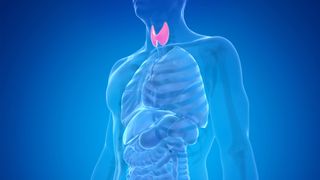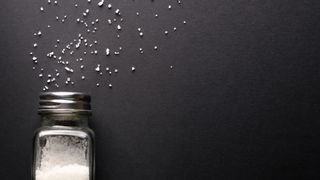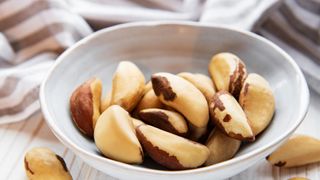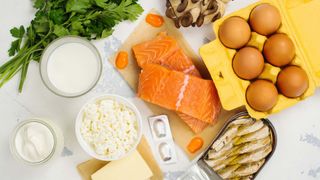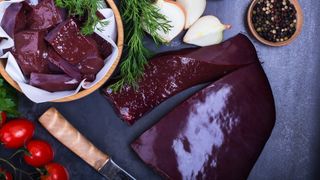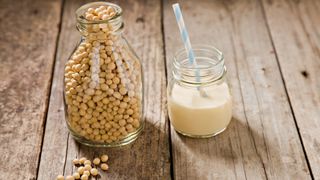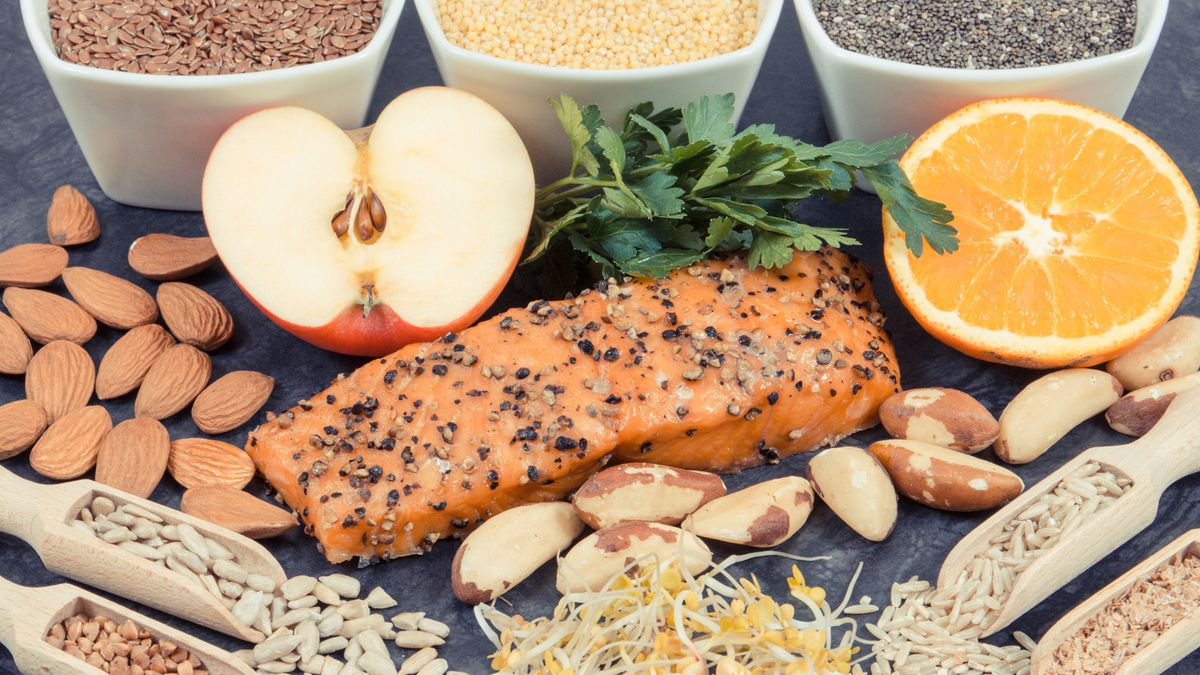
If you have just been diagnosed with an underactive thyroid, you may be wondering whether there is a specific hypothyroidism diet that could help to treat your condition. Unfortunately, pharmaceutical medication is the only treatment that can restore your thyroid function. But this being said, certain nutritional factors may still provide some relief from your symptoms.
“Food and nutrients alone will not stop hypothyroidism,” says Dr. Pamela Mason, PhD, from the Health & Food Supplements Information Service (opens in new tab). “Medical care is essential. That said, a good diet makes an important contribution to thyroid health.”
An underactive thyroid has a profound impact on how our bodies use and store nutrients. “In hypothyroidism, our body’s metabolism suffers numerous changes,” explains Lustin-Nicolae Bilibou, a specialist clinical dietitian at Cygnet Health Care (opens in new tab). “Cholesterol and triglycerides levels will record elevated values, we might experience low protein synthesis, as well as low levels of intestinal sugar absorption. An underactive thyroid can also impact vitamin metabolism.”
Taking into account how complex this condition is, it’s difficult to pinpoint an exact dietary pattern that could help manage it. “There are reports of particular diets that have worked for different people, however they are not a standard medical or dietetic approach for hypothyroidism,” says Bilibou.
Here, we’ve put together a guide to what research tells us so far about a hypothyroidism diet. But as Mason stresses, “if you are diagnosed with hypothyroidism, check immediately with your doctor and a qualified dietitian about an appropriate diet. It is important to get individual specialist advice on foods and nutrients as the intake of these will depend on the current health of your thyroid gland and the medication prescribed for you.”
What is hypothyroidism?
According to the National Institute of Diabetes and Digestive and Kidney Diseases (opens in new tab), hypothyroidism (often referred to as underactive thyroid) is when the thyroid gland doesn’t produce enough thyroid hormones to meet the body’s needs. There are many different causes for this condition, but they are often linked to damage in the thyroid gland or autoimmune reactions in the body.
The thyroid is a small, butterfly-shaped gland located in the front of your neck. It releases the hormones calcitonin, T4 (thyroxine, or tetraiodothyronine) and T3 (triiodothyronine) into the bloodstream. They control the rate at which cells and organs use oxygen and energy from food. So when your levels of thyroid hormones are low, your body’s metabolism slows down. Low levels of thyroid hormones can lead to a range of symptoms, including weight gain, decreased energy levels, low mood and muscle aches.
What are the best foods to eat for hypothyroidism?
Certain nutrients may improve the functioning of the thyroid gland, while certain dietary compounds may lower the effectiveness of hypothyroidism medications.
While we still don’t understand the full scope of interactions between underactive thyroid and dietary patterns, multiple studies (opens in new tab) suggest that eating plenty of foods rich in anti-inflammatory vitamins and minerals can be highly beneficial for the management of thyroid diseases.
Increasing your intake of plant-based antioxidants and reducing the consumption of animal-based foods could also be helpful, according to the Thyroid (opens in new tab) journal.
Iodine
Iodine is a key component of a hypothyroidism diet. According to The Lancet (opens in new tab) journal, this trace mineral is essential for thyroid hormone production, and not getting enough of it is directly linked to hypothyroidism.
According to The American Journal of the Medical Sciences (opens in new tab), iodine deficiency is very common and affects nearly one-third of the world’s population. However, it’s less of an issue in the United States, where table salt is routinely enriched with iodine and many iodine-rich foods are widely available.
It’s also worth pointing out that iodine supplements need to be taken with caution. Scientists from the International Journal of Endocrinology (opens in new tab) suggest that certain at-risk individuals may actually develop thyroid problems when increasing their iodine intake. Meanwhile, researchers from the European Journal of Endocrinology (opens in new tab) indicate that we need more data to fully understand the potential risks and benefits of such supplementation.
“Ask for medical or dietetic advice before elevating the iodine in your diet, for inappropriate consumption may negatively affect thyroid function instead of balancing it,” agrees Bilibou.

Lustin-Nicolae Bilibou
Bilibou is an experienced clinical dietitian with a demonstrated history of working in the hospital & health care industry. He has a Bachelor’s degree in Dietetics and two Master’s degrees in Clinical Dietetics and Health Management Systems.
Daily Value (DV) for iodine: 150mcg
Safe upper limit for iodine: 1100mcg
Iodine-rich foods include: Dried seaweed, cod, iodized table salt, baked potato, cow’s milk, shrimp, turkey breast, navy beans and egg.
Selenium
The thyroid contains the highest amount of selenium per gram of tissue of all organs in the human body. Without this important mineral, thyroid hormones will not work properly, and as such, it may be another key component of a hypothyroidism diet.
According to The Journal of Clinical Endocrinology and Metabolism (opens in new tab), low levels of selenium increase the risk of developing thyroid diseases. And as described in the International Journal of Endocrinology (opens in new tab), supplementation with this trace mineral helps patients with autoimmune thyroid conditions get relief from their symptoms.
Selenium is also a powerful antioxidant that shields the thyroid gland from damage inflicted by free radicals. And according to Mason, a lot of us aren’t getting enough of this nutrient. “Our report showed that average intakes of selenium amount to 76{35112b74ca1a6bc4decb6697edde3f9edcc1b44915f2ccb9995df8df6b4364bc} of recommended intakes,” she says.

Mason qualified as a pharmacist in 1976 and practised as a community pharmacist until 1998. During the 1980, she also studied for an Master’s degree and a PhD in nutrition at King’s College London.
Daily Value (DV) for selenium: 55mcg
The safe upper limit for selenium: 400mcg
Selenium-rich foods include: Brazil nuts, tuna, shellfish, lean pork chops, beef steak, tofu, whole wheat pasta and sunflower seeds.
Zinc
Like selenium, zinc helps to ‘activate’ thyroid hormones so they can be used by the body’s cells. According to the BMJ Journal (opens in new tab), patients suffering from thyroid diseases tend to have lower levels of zinc. It plays a key role in the metabolism of thyroid hormones and helps regulate their blood levels, as stated in the International Journal for Vitamin and Nutrition Research (opens in new tab).
However, researchers from the Biological Trace Element Research (opens in new tab) journal point out that there is not enough evidence that zinc supplementation helps with hypothyroidism. Still, taking into account how crucial this nutrient is for overall health, it’s important to make sure you’re getting enough of it.
Daily Value (DV) for zinc: 11mg
Safe upper limit for zinc: 40mg
Zinc-rich foods include: Oysters, beef steak, chicken, tofu, lean pork chops, pumpkin seeds, lentils and low-fat yogurt.
Vitamin D
Vitamin D may also be an important part of a hypothyroidism diet. According to a meta-analysis published in the BMC Endocrine Disorders (opens in new tab) journal, individuals with underactive thyroid tend to have lower levels. There’s also growing evidence (opens in new tab) that low vitamin D status is linked to autoimmune thyroid diseases, while impaired vitamin D metabolism may be a risk factor for thyroid cancers.
At the same time, researchers from the Frontiers in Immunology (opens in new tab) point out that the underlying mechanisms behind these associations are largely unknown.
Daily Value (DV) for vitamin D: 600IU
Safe upper limit for vitamin D: 2000IU
Foods rich in vitamin D include: Oily fish, eggs, fortified mushrooms, fortified milk, tofu, fortified yogurt and fortified breakfast cereals.
Vitamin B12
Vitamin B12 could be another important factor when it comes to thyroid health. A study published in the JPMA (opens in new tab) journal suggests that up to 40{35112b74ca1a6bc4decb6697edde3f9edcc1b44915f2ccb9995df8df6b4364bc} of patients with hypothyroidism suffer from vitamin B12 deficiency, and supplementation may help improve the symptoms.
Another study reported that low levels of B12 may be linked to autoimmune thyroid diseases. At the same time, researchers from the Clinical Medicine Insights (opens in new tab) did not find a similar link.
Still, eating more foods rich in B12 and other B vitamins may also confer other benefits. “They can produce high amounts of energy and can slightly increase basal metabolism,” explains Bilibou.
Daily Value (DV) for vitamin B12: 2.4mcg
Foods rich in vitamin B12 include: clams, tuna, beef steak, fortified cereals, fortified soy milk, fortified tofu, low-fat milk and eggs.
Vitamin A
Vitamin A may also help to regulate thyroid hormone metabolism. Scientists from the International Journal for Vitamin and Nutrition Research (opens in new tab) suggest that it may increase the risk of hypothyroidism when it occurs alongside iodine deficiency. And according to a study published in the Journal of the American College of Nutrition (opens in new tab), vitamin A supplementation may help to reduce the risk of developing underactive thyroid in premenopausal women.
Daily Value (DV) for Vitamin A: 900μg of retinol activity equivalents (RAEs).
Safe upper limit for vitamin A: 3000μg of retinol activity equivalents (RAEs).
Foods rich in vitamin A include: carrots, tuna, butternut squash, sweet potato, spinach, cantaloupe, lettuce and red bell pepper.
Tyrosine
Eating foods rich in tyrosine, a non-essential amino acid (one of the protein building blocks), could be another key component of a hypothyroidism diet. Tyrosine and iodine are needed for the proper functioning of thyroid hormones in the body. They may also help to burn more calories.
“Include protein at every meal or snack as protein tends to be satiating and may help to improve metabolism, so protein may help to maintain weight,” advises Mason.
Tyrosine-rich foods include: beef steak, lean pork chops, salmon, lean chicken breast, tofu, milk, ricotta cheese, white beans and pumpkin seeds.
Are there any foods you should avoid with an underactive thyroid?
Interactions with levothyroxine
Levothyroxine is a common medication for hypothyroidism. It aims to replace or provide more of the thyroid hormone thyroxine, which is normally released by the thyroid gland. It is a very effective treatment, but certain dietary components may reduce its availability in the body.
“Levothyroxine should be taken at the same time every day and on an empty stomach as it interacts with a bunch of foods and medications,” advises Giulia Guerrini, lead pharmacist at Medino (opens in new tab). “It’s okay to have your morning tea or coffee 30 minutes after taking levothyroxine, but avoid eating yogurt, drinking milk, or having cheese and broccoli at least for another four hours, as these calcium-rich foods prevent you from absorbing the active ingredient.”
Gluten
Scientists have been researching potential links between gluten consumption and hypothyroidism, but so far the results are inconclusive. According to a meta-analysis published in the PLoS One (opens in new tab) journal, rates of thyroid disease are significantly higher among patients with celiac disease. However, scientists from the Nutrients (opens in new tab) journal point out there is not enough evidence to suggest that gluten-free diet can improve the symptoms of autoimmune thyroid conditions.
But dieticians suggest reducing gluten consumption could still be helpful. “It might be beneficial for a person experiencing low thyroidal hormonal activity, such as Hashimoto disease patients,” says Bilibou. “For example, instead of wheat, specialists suggest that quinoa, chia, whole grain rice, wild rice and buckwheat might be healthier alternatives. Also, particular attention should be paid to sausages and other types of processed or pre-cooked meat products as well as different mixtures of baking powders, yeasts and modified starch.”
Goitrogens
Goitrogens is an umbrella term used to describe compounds that are able to cause swelling or dysfunction of the thyroid gland. Many common plant-based foods contain one or more goitrogenic substances, including sweet potatoes, pine nuts, peaches and broccoli.
In many cases, cooking can help to inactivate these compounds. Many recently published studies also question whether they are as harmful as we deem them to be.
For example, it has been suggested that cruciferous vegetables (such as cabbage, broccoli, cauliflower and kale) may lead to swelling and enlargement of the thyroid gland. However, they may need to be ingested in relatively large amounts to produce harmful effects, as described in the Human Toxicology (opens in new tab) journal.
Cruciferous vegetables are a rich source of progoitrin and glucosinolates — substances that break down to goitrin and thiocyanate during the digestive process. According to the Nutrition Reviews (opens in new tab), thyroid hormone production is affected when the goitrin levels exceed 194 μmol. Only collards, Brussels sprouts and Russian kale contain such amounts.
“It is very important to mention that a balanced diet for someone with hypothyroidism should not completely eliminate cruciferous vegetables,” agrees Bilibou. “But it is important to remember that if consumed, they should be cooked and not consumed raw as substances that may reduce the synthesis of thyroxine are nullified under thermal action.”
Soy and soy-based foods
For many years, people with thyroid problems have been advised to avoid soy and soy-based foods like tofu and tempeh. Isoflavones, a common compound in soy, was deemed to be a powerful goitrogen.
However, recent studies have suggested that this may not be the case. According to a meta-analysis published in the Scientific Reports (opens in new tab) journal, soy supplementation has no effect on thyroid hormone levels. And as it was reported in the Thyroid (opens in new tab) journal, there is little evidence that soy foods have a negative impact on thyroid function in individuals obtaining enough iodine.
Still, some in vitro and animal studies suggest that without enough iodine, soy foods may increase the risk of hypothyroidism. Mason also points out that soya can interfere with thyroxine absorption.
“Thyroxine is often prescribed in hypothyroidism,” she says. “If you are taking thyroxine, then you may be advised to avoid soya altogether. Alternatively, you may be advised to leave a long gap between eating soya and taking thyroxine.”
Dietary fat
There is growing evidence that dietary fat may play a role in thyroid health. According to the Molecular Nutrition and Food Research (opens in new tab) journal, eating too much fat rich in saturated and monounsaturated fatty acids may interfere with thyroid hormone production and increase the risk of hypothyroidism.
A 2014 study (opens in new tab) has demonstrated that rats fed a high-fat diet led to changes in the structure and functioning of the thyroid gland. However, more human studies are needed to confirm these findings.
Coffee and green tea
Some beverages may be harmful to the thyroid gland. One of them is coffee. According to the Thyroid (opens in new tab) journal, coffee may slow down the absorption of thyroxine in the intestines.
Green tea, a rich source of powerful flavonoids credited with many health benefits, when ingested in high doses may induce swelling and enlargement of the thyroid gland, as described in a study published in the Archives of Toxicology (opens in new tab) journal.
Tips for a hypothyroidism diet
When it comes to managing an underactive thyroid, Bilibou stresses the importance of thoughtful food choices. “Hypothyroidism creates difficulties in body weight management, thus making the quality of the foods you consume not necessarily a fancy, but a necessity,” he says. “As an example, the meat you consume should be provided from local farmers or local shops rather than supermarkets, as it is common practice for big suppliers to merchandise meat from animals who have been hormone fed or artificially growth stimulated. These hormones can have a negative impact on the patient with an underactive thyroid.”
He also recommends reducing sugar consumption, because sugary foods have a high glycaemic index, which makes them absorbed faster into our bodies. “In patients with an underactive thyroid, due to a slow basal metabolism, sweet foods might be easier assimilated as fats into the body,” he explains.
Another food group to include are vegetables, ideally from an organic source. “Foods such as beetroot, kohlrabi, onion, parsley, radishes, rhubarb, pumpkins, sweet potatoes and spinach are all nutrient-dense vegetables which are rich in folic acid, vitamins and minerals,” says Bilibou. “These foods also contain high amounts of fiber, necessary for a healthy bowel movement as hypothyroidism can lead to frequent episodes of constipation.”
He also recommends cutting down on dairy products and eggs. “Individuals should reduce or even eliminate, if necessary, fat dairy products, while low fat dairy products should be consumed in moderate quantities — two to three times per week.”
This article is for informational purposes only and is not meant to offer medical advice.

